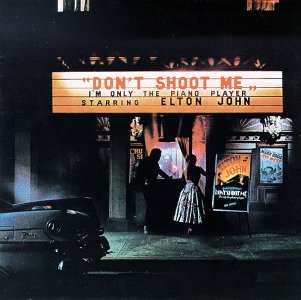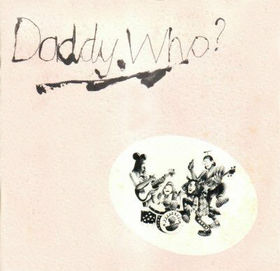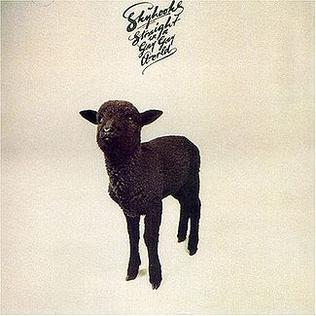Related Research Articles
Goanna were an Australian rock band which formed in 1977 in Geelong as The Goanna Band with mainstay Shane Howard as singer-songwriter and guitarist. The group integrated social protest with popular music and reached the Top 20 on the Australian Kent Music Report Singles Chart with "Solid Rock" (1982) and "Let the Franklin Flow". Their debut album, Spirit of Place peaked at No. 2 on the related albums chart. They disbanded in 1987 and briefly reformed in 1998.

Don't Shoot Me I'm Only the Piano Player is the sixth studio album by English singer-songwriter Elton John. Released in January 1973 by DJM Records, it was John's sixth normal studio album release, first of his two studio albums released in 1973, and was his second straight No. 1 album in the US.

Ross Andrew Wilson is an Australian singer-songwriter, musician and producer. He is the co-founder and frontman of the long-standing rock groups Daddy Cool and Mondo Rock, as well as a number of other former bands, in addition to performing solo. He has produced records for bands such as Skyhooks and Jo Jo Zep & the Falcons, as well as for those of his own bands. He appeared as a judge on celebrity singing TV series It Takes Two from 2005. Wilson was individually inducted into the Australian Recording Industry Association (ARIA) Hall of Fame in 1989 and again as a member of Daddy Cool in 2006.

"Eagle Rock" is an Australian rock song, released by Daddy Cool in May 1971 on the Sparmac record label. It went on to become the best-selling Australian single of the year, achieving gold status in eleven weeks, and remaining at No. 1 on the national charts for a (then) record ten weeks. "Eagle Rock" also spent 17 weeks at the No. 1 spot on the Melbourne Top 40 Singles Chart. The song was re-released by Wizard Records in 1982, and reached No. 17 on the Australian singles charts.
Mondo Rock were an Australian rock band formed in November 1976 by singer-songwriter, Ross Wilson. Guitarist Eric McCusker, who joined in 1980, wrote many of the band's hits, and along with Wilson formed the core of the group. They're best known for their second album, Chemistry which was released in July 1981 and peaked at number 2 on the Australian Kent Music Report. Their song "Come Said the Boy" peaked at number 2 in Australia in 1983.
Ross Andrew Hannaford was an Australian musician, active in numerous local bands. He was often referred to by his nickname "Hanna". Widely regarded as one of the country's finest rock guitarists, he was best known for his long collaboration with singer-songwriter Ross Wilson, which began as teenagers, with The Pink Finks and forming the seminal early '70s Australian rock band Daddy Cool. Hannaford died of cancer after being diagnosed a year earlier.
Robert George Porter is an Australian country, pop-rock musician, producer and record label owner.
Gary Young is an American-born Australian musician who was a founding member of Australian rock band Daddy Cool in which he played the drums and sang backing vocals. He also played drums with Jo Jo Zep & The Falcons amongst other bands. Young was twice inducted into the Aria Hall of Fame as a member of both Daddy Cool and Jo Jo Zep & The Falcons which were inducted into the Australian Recording Industry Association (ARIA) Hall of Fame in 2006 and 2007 respectively.

Living in the 70's is the debut album by Melbourne band Skyhooks. Released in October 1974 on the Mushroom Records label, the album achieved relatively little success until early 1975. It spent 16 weeks at the top of the Australian album charts from late February 1975, and became the highest-selling album by an Australian act in Australia until that time, with sales of 240,000. In October 2010, it was listed at No. 9 in the book 100 Best Australian Albums. The album's eponymous track was ranked number 72 as part of Triple M's "Ozzest 100", the 'most Australian' songs of all time ranking.

Daddy Who?... Daddy Cool is the 1971 debut album by Australian rock band Daddy Cool.

Straight in a Gay Gay World was the third studio album released by Australian rock band, Skyhooks. The album was released on 23 August 1976. With the exception of "Million Dollar Riff", it was recorded at The Record Plant in Sausalito, California, after the band's first tour of the United States earlier in the same year. The title and songs are a sort of view the band had on their experience in the States. Like the band's first two albums, Living in the 70's and Ego Is Not a Dirty Word, Straight in a Gay Gay World was produced by former Daddy Cool leader Ross Wilson. The album was released by Mushroom Records. It peaked at No. 3 on Australian charts.
Daddy Cool are an Australian rock band formed in Melbourne, Victoria in 1970 with the original line-up of Wayne Duncan, Ross Hannaford, Ross Wilson and Gary Young. Their debut single "Eagle Rock" was released in May 1971 and stayed at number 1 on the Australian singles chart for ten weeks. Their debut July 1971 LP Daddy Who? Daddy Cool also reached number 1 and became the first Australian album to sell more than 100,000 copies. The group's name came from the 1957 song "Daddy Cool" by US rock group The Rays. Daddy Cool included their version of this song on Daddy Who? Daddy Cool.
Sons of the Vegetal Mother were an Australian "esoteric special-occasion progressive band", formed in late 1969, with a floating line-up based around the nucleus of Ross Wilson and Ross Hannaford. A side-project of the band, formed in 1970 was Daddy Cool, which played 1950s doo-wop music plus some originals. Daddy Cool were to eclipse their parent band when their debut single "Eagle Rock" reached No. 1 on the Australian National charts.
Mighty Kong were an Australian 'supergroup' successor to Daddy Cool, which broke up in August 1972. It was also the fifth in the line of groups that featured singer-songwriter Ross Wilson and guitarist Ross Hannaford, which began with Pink Finks in 1965. Despite its all-star line-up, drawing from three of the top groups of the time, the band was short-lived and never really achieved its considerable potential, effectively relegated to being a footnote in the story of Daddy Cool.

Sex, Dope, Rock'n'Roll: Teenage Heaven, released as simply Teenage Heaven in the US, is the second studio album by Australian rock band Daddy Cool, released in December 1971. It reached number 15 on the Kent Music Report, and contains the hit single "Hi Honey Ho". It was their last studio album for 34 years, until the release of their 2006 album, The New Cool.

The New Cool is the third studio album, by Australian rock band Daddy Cool. It was released in November 2006, thirty-four years after the release of their previous studio album, Sex, Dope, Rock'n'Roll: Teenage Heaven.
Wayne Ian Duncan was an Australian rock musician. In 1970 he was a founding member of the doo-wop band, Daddy Cool, providing bass guitar and backing vocals. They were inducted into the ARIA Hall of Fame in 2006. During his career he had also been a member of the Rondells, Sons of the Vegetal Mother, Gary Young's Hot Dog, Jane Clifton and the Go Go Boys, the Black Sorrows, and the Hornets. In late November 2016 Duncan had a stroke and died a week later, he was survived by his domestic partner, Anne, and by two children. According to Australian music journalist, Ian McFarlane, "Duncan was never a sedate bassist. One only has to listen to some of the latter-day DC material... to hear how inventive his playing could be."

Boom Baby Boom is the fifth studio album by Australian rock band Mondo Rock, released in September 1986. It peaked at number 27 on the Kent Music Report.

Daddy's Coolest is the sixth compilation album by Australian rock band Daddy Cool, released in 1982. The album peaked at number 5 on the Australian Kent Music Report and at number 29 on the Recorded Music NZ albums charts. It includes tracks from Daddy Cool's two studio albums Daddy Who? Daddy Cool and Sex, Dope, Rock'n'Roll: Teenage Heaven. The album was re-released in 1992, which reached number 35 on the ARIA Charts.

"Come Said the Boy" is a song by Australian rock band Mondo Rock, released in November 1983 as the lead single from the band's fourth studio album The Modern Bop (1984). The song became the band's highest-charting single, peaking at number 2 on the Kent Music Report. It was written by the group's lead guitarist, Eric McCusker, and was co-produced by John Sayers and the band.
References
- ↑ Kent, David (1993). Australian Chart Book 1970-1992 . St Ives, N.S.W.: Australian Chart Book. ISBN 0-646-11917-6. NOTE: Used for Australian Singles and Albums charting from 1970 until ARIA created their own charts in mid-1988.
- ↑ Craig Horne (2018). Daddy Who?. Melbourne Books. p. 89. ISBN 9781925556254.
- ↑ Greig Johnston. "Mondo Rock's Ross Wilson Daddy Cool about performing on A Day on the Green bill with Farnham". Eastern Reporter.
- ↑ Greg Phillips. "ROSS HANNAFORD". australianmusician.com.au.
- ↑ Craig Horne (2018). Daddy Who?. Melbourne Books. p. 105. ISBN 9781925556254.
- ↑ David Laing. "DADDY COOL: AUSTRALIA'S UNSUNG ROCK & ROLL GREATS". PLease Kill Me.
- ↑ Martin Curtis. "Death sentence fanned Daddy Cool guitar ace's creative flame". Sydney Morning Herald.
- ↑ Guy Blackman. "Who's your daddy". The Age.
- ↑ "Daddy Who". Go-Set. November 1971.